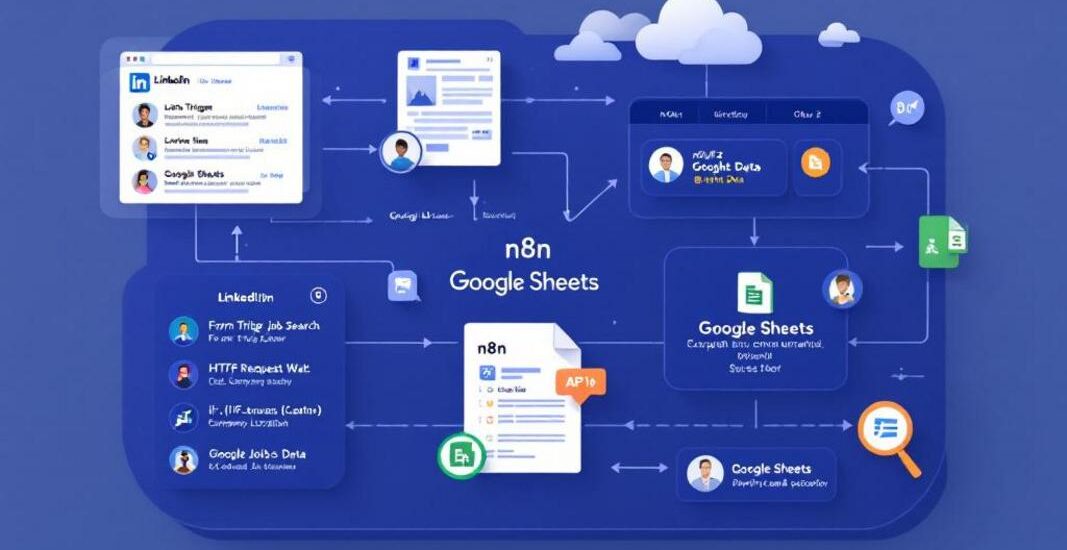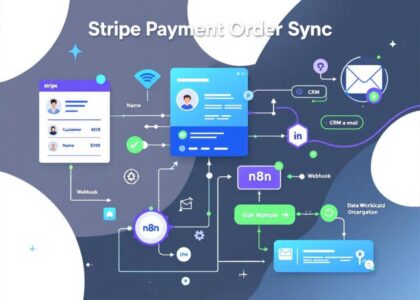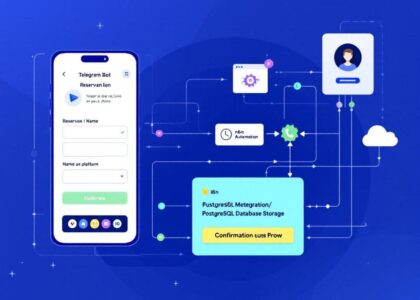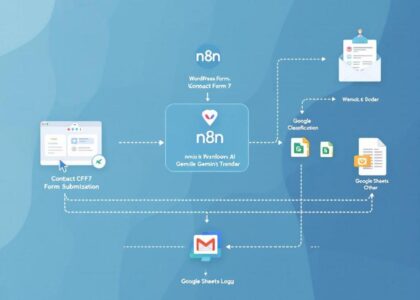LinkedIn Hiring Signal Scraper — Jobs & Prospecting Using Bright Data
Purpose:
Discover recent job posts from LinkedIn using Bright Data’s Dataset API, clean the results, and log them into Google Sheets — for both job hunting and identifying high-intent B2B leads based on hiring activity.
Use Cases:
- Job Seekers – Spot relevant openings filtered by role, city, and country.
- Sales & Prospecting – Use job posts as buying signals.
If a company is hiring for a role you support (e.g. marketers, developers, ops) —
it’s the perfect time to reach out and offer your services.
Tools Needed:
- n8n Nodes:
- Form Trigger
- HTTP Request
- Wait
- If
- Code
- Google Sheets
- Sticky Notes (for embedded guidance)
- External Services:
- Bright Data (Dataset API)
- Google Sheets
API Keys & Authentication Required:
-
Bright Data API Key
→ Add in the HTTP Request headers:
Authorization: Bearer YOUR_BRIGHTDATA_API_KEY -
Google Sheets OAuth2
→ Connect your account in n8n to allow read/write access to the spreadsheet.
General Guidelines:
- Use descriptive names for all nodes.
- Include retry logic in polling to avoid infinite loops.
- Flatten nested fields (like
job_posterandbase_salary). - Strip out HTML tags from job descriptions for clean output.
Things to be Aware Of:
- Bright Data snapshots take ~1–3 minutes — use a Wait node and polling.
- Form filters affect output significantly:
🔍 We recommend filtering by “Last 7 days” or “Past 24 hours” for fresher data. - Avoid hardcoding values in the form — leave optional filters empty if unsure.
Post-Processing & Outreach:
- After data lands in Google Sheets, you can use it to:
- Personalize cold emails based on job titles, locations, and hiring signals.
- Send thoughtful LinkedIn messages (e.g., “Saw you’re hiring a CMO…”)
- Prioritize outreach to companies actively growing in your niche.
Additional Notes:
-
📄 Copy the Google Sheet Template:
Click here to make your copy
→ Rename for each campaign or client. -
Form fields include:
- Job Location (city or region)
- Keyword (e.g., CMO, Backend Developer)
- Country (2-letter code, e.g., US, UK)
This workflow gives you a competitive edge —
📌 For candidates: Be first to apply.
📌 For sellers: Be first to pitch.
All based on live hiring signals from LinkedIn.
STEP-BY-STEP WALKTHROUGH
Step 1: Set up your Google Sheet
- Open this template
- Go to
File → Make a copy - You’ll use this copy as the destination for the scraped job posts
Step 2: Fill out the Input Form in n8n
The form allows you to define what kind of job posts you want to scrape.
Fields:
- Job Location → e.g.
New York,Berlin,Remote - Keyword → e.g.
CMO,AI Architect,Ecommerce Manager - Country Code (2-letter) → e.g.
US,UK,IL
💡 Pro Tip:
For best results, set the filter inside the workflow to:
time_range = "Past 24 hours" or "Last 7 days"
This keeps results relevant and fresh.
Step 3: Trigger Bright Data Snapshot
The workflow sends a request to Bright Data with your input.
Example API Call Body:
[
{
"location": "New York",
"keyword": "Marketing Manager",
"country": "US",
"time_range": "Past 24 hours",
"job_type": "Part-time",
"experience_level": "",
"remote": "",
"company": ""
}
]
Bright Data will start preparing the dataset in the background.
Step 4: Wait for the Snapshot to Complete
The workflow includes a Wait Node and Polling Loop that checks every few minutes until the data is ready.
You don’t need to do anything here — it’s all automated.
Step 5: Clean Up the Results
Once Bright Data responds with the full job post list:
✔️ Nested fields like job_poster and base_salary are flattened
✔️ HTML in job descriptions is removed
✔️ Final data is formatted for export
Step 6: Export to Google Sheets
The final cleaned list is added to your Google Sheet (first tab).
Each row = one job post, with columns like:
job_title, company_name, location, salary_min, apply_link, job_description_plain
Step 7: Use the Data for Outreach or Research
Example for Job Seekers:
You search for:
- Location: Berlin
- Keyword: Product Designer
- Country: DE
- Time range: Past 7 days
Now you’ve got a live list of roles — with salary, recruiter info, and apply links.
→ Use it to apply faster than others.
Example for Prospecting (Sales / SDR):
You search for:
- Location: London
- Keyword: Growth Marketing
- Country: UK
And find companies hiring growth marketers.
→ That’s your signal to offer help with media buying, SEO, CRO, or your relevant service.
Use the data to:
- Write personalized cold emails (“Saw you’re hiring a Growth Marketer…”)
- Start warm LinkedIn outreach
- Build lead lists of companies actively expanding in your niche
API Credentials Required:
-
Bright Data API Key
Used in HTTP headers:Authorization: Bearer YOUR_BRIGHTDATA_API_KEY -
Google Sheets OAuth2
Allows n8n to read/write to your spreadsheet
Adjustments & Customization Tips:
- Modify the HTTP Request body to add more filters (e.g. job_type, remote, company)
- Increase or reduce polling wait time depending on Bright Data speed
- Add scoring logic to prioritize listings based on title or location
Final Notes:
-
📄 Google Sheet Template:
Make your copy here -
⚙️ Bright Data Dataset API:
Visit BrightData.com -
📬 Personalization works best when you act quickly.
Use the freshest data to reach out with context — not generic pitches.
This workflow turns LinkedIn job posts into sales insights and job leads.
All in one click. Fully automated. Ready for your next move.






